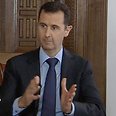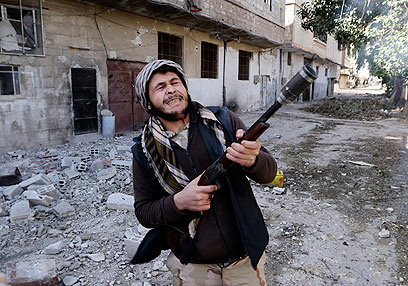
Bashar Assad vowed that Syria would retaliate against Israel for an airstrike on a weapons convoy in the Damascus area last month, which foreign news outlets attributed to the IDF.
"Retaliation does not mean missile for missile or bullet for bullet. Our own way does not have to be announced," the Syrian president said in a televised interview with The Sunday Times.
Related stories:
- Syrian group: Heroic Iranian regime created Sandy
- Syrian rebel chief: Fighters desperate for arms
- Syria, Iran say Assad to remain in power until 2014
Assad told the British newspaper Saturday night that Syria had always retaliated for Israeli actions, "but we retaliated in our own way, and only the Israelis know what we mean."
In late January the Syrian army announced that "Israeli planes attacked a military research center in Damascus district." Other reports said the airstrike targeted a convoy carrying advanced SA-17 anti-aircraft missiles to Lebanon. A week later Defense Minister Ehud Barak said during a security conference in Munich, "What happened in Syria several days ago… that's proof that when we say something we mean it. We say that we don't think it should be allowed to bring advanced weapons systems into Lebanon."
During the interview, Assad refused to address reports that Syria was moving its chemical weapons stockpiles for fear they will be seized by rebel forces. He also denied reports that Russia, Hezbollah and Iran had sent soldiers to Syria, saying: "Russia has been very constructive, Iran has been very supportive and Hezbollah's role is to defend Lebanon, not Syria.
"We are a country of 23 million people with a strong national army and police force. We are in no need of foreign fighters to defend our country," Assad told The Sunday Times.
In the interview, the Syrian president warned of grave consequences if the West armed the rebels, directly or indirectly. "You know the crime is not only about the victim and the criminal but also the accomplice providing support, whether it is moral or logistical support," he said.
"Syria lies at the fault line geographically, politically, socially and ideologically. So playing with this fault line will have serious repercussions all over the Middle East. Any intervention will not make things better. It will only make them worse. Europe and the United States and others are going to pay the price sooner or later with the instability in this region. They do not foresee it."

'We are ready to negotiate with anyone.' Syrian rebel (Photo: Reuters)
Assad leveled harsh criticism at Britain, saying that instead of pushing for peace talks, David Cameron's "naive, confused, unrealistic" government was trying to end an EU arms embargo so that the rebels could be supplied with weapons.
This, he said, would fan the flames of war at a time when an al-Qaeda-backed element of the uprising, Jabhat al-Nusra, was already "killing, beheading, torturing and preventing children from going to school."
"To be frank, Britain has played a famously unconstructive role in our region on different issues for decades, some say for centuries ... The problem with this government is that their shallow and immature rhetoric only highlights this tradition of bullying and hegemony," he said.
"How can we ask Britain to play a role while it is determined to militarize the problem? How can we expect them to make the violence less while they want to send military supplies to the terrorists?"
Assad was referring to British Foreign Secretary William Hague's comments during a recent meeting with the Friends of Syria group in Rome. Hague stressed military aid to the rebels trying to topple Assad was possible in the future. "That will be an important decision, of course, and has its own risks, and that is why we haven't done that so far. But I don't rule that out," he said.
In the interview, Assad invited the Syrian opposition to join in a national dialogue aimed at ending the crisis.
"We are ready to negotiate with anyone, including militants who surrender their arms," he told The Sunday Times. "We are not going to deal with terrorists who are determined to carry weapons, to terrorize people, to kill civilians, to attack public places or private enterprise and to destroy the country."
"We have opposition that are political entities and we have armed terrorists. We can engage in dialogue with the opposition, but we cannot engage in dialogue with terrorists. We fight terrorism," he said.















